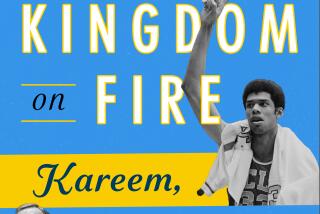Ornest Loved Sports and Life
- Share via
It won’t be any fun breaking bread around the Friars’ Club for a while. They’ll be missing Harry Ornest, who died Tuesday.
The Friars was Ornest’s front porch; the world of sports was his living room.
He was a man who grew up in Edmonton, started a vending machine business in Western Canada while he worked as a referee in the NHL, and eventually gathered the wherewithal to own one of the teams he once officiated and the building it played in when he bought the St. Louis Blues.
Nobody else has ever done that.
But then, not all that many people have had Tony Martin sing a special song (“I’m Just Wild About Harry”) and Red Buttons do the closing act at their 75th birthday party. Ornest did, just 21 days ago.
Besides the Blues, at various times Ornest also owned the Vancouver minor league baseball franchise in the old Pacific Coast League and the Toronto Argonauts franchise in the Canadian Football League.
And he never stopped itching for more action, even though his role at the time of his death as the vice chairman of Hollywood Park racetrack would be enough to keep most 70-year-olds plenty busy. In just the last year, Ornest and Hollywood Park Chairman R.D. Hubbard had negotiated hard with Donald Sterling to buy the Clippers, build a new arena at Hollywood Park and make Jerry West the team president.
Ornest loved the action, loved the chess pieces of the deal. If it was a sports team and he didn’t own it, he loved trying to figure out how he might.
He was wealthy, but not ostentatious. When he sold the Argonauts to Bruce McNall and then ended up in a long line of creditors to get some payment out of the bankruptcy proceedings that followed McNall’s incredible financial free fall, Ornest was asked how he was dealing with the likely loss of a couple of million dollars.
“It makes me uncomfortable,” he said, his matter-of-fact way of saying that, while a couple of million wasn’t pocket change, it also wasn’t lifestyle-threatening.
He was wealthy, but not the least bit cheap. The Ornest Family Foundation has been a major supporter of numerous charities over the years, many of which never even asked.
Mostly, Harry Ornest was a man who loved sports, loved the intrigue of them and loved just about everything having to do with them.
The latter could be considered his biggest failing. It meant that he actually liked sportswriters. While others in his position tolerated them, Ornest befriended them. He was a voracious newspaper reader, and for those sportswriters to whom he became especially close, he became a one-man clipping service.
He also was a valuable source for sportswriters who frequently needed help understanding things such as municipal bonds, debt service and eminent domain. Ornest would take as long as needed to explain, spending hours on the phone with sportswriters every week. In his wonderfully sarcastic way, he called it “educating the unwashed.”
He had few enemies; only business competitors. He had hundreds of friends, and he treated them all alike. Like royalty.
The man whom his daughter, Laura, called the “family inspiration,” always reserved a kind of warm sarcasm for special friends and memories.
Sportscaster Stu Nahan of Channel 5, in his long-ago youth a passable hockey player in the minor leagues, was given one game-misconduct penalty in his career, causing his only ejection. The referee dishing it out was Ornest.
In later years, the two loved to kid about it. The conversation usually went something like this:
Nahan: “That ejection cost me my career.”
Ornest: “What career?”
Ornest couldn’t do enough for his friends. His generosity had no price tag, no payback or even implied payback. There were plenty of free lunches with Ornest. He always paid. He wouldn’t allow it any other way.
A friend told him one day at lunch at the Friars’ Club that he was going to make a speech the next day, and he was hoping to weave in a little humor. “Maybe I can help,” Ornest said.
An hour later, the friend received a phone call from a person with some suggestions and some jokes. The person was Milton Berle, and even though the jokes had all been stolen, the fact that Ornest had gone to that amount of trouble to get Berle to call was another measure of how he treated friends.
Ornest loved to laugh, loved the Friars’ Club and its frequent comedy shows and roasts. As recently as 10 days ago, when Steve Allen passed the gavel as Friars’ Abbot to Larry King and King accepted it--saying he had no idea what an Abbot did but that he would be a good one--Ornest was there, doubled over in laughter.
Ornest was a major inside player in the sports dealings of Southern California. He may not have been a household name to the fans, but to those who envision arenas and covet franchises and know the hows and wheres and whys of the deals that affect the Southland sports market, his loss is major.
One of the long-standing comedy lines at the Friars, where the dinner mints are Viagra, is that the average age of club members is deceased. For a while at least, in a place where nothing is sacred nor safe from biting humor, that line won’t be so funny.
More to Read
Go beyond the scoreboard
Get the latest on L.A.'s teams in the daily Sports Report newsletter.
You may occasionally receive promotional content from the Los Angeles Times.











